
Lingayatism is a Hindu denomination based on Shaivism. Initially known as Veerashaivas, since the 12th-century adherents of this faith are known as Lingayats.

Dalit, also some of them previously known as untouchables, is the lowest stratum of the castes in the Indian subcontinent. Dalits were excluded from the fourfold varna of the caste hierarchy and were seen as forming a fifth varna, also known by the name of Panchama. Several scholars have drawn parallels between Dalits and the Burakumin of Japan, the Baekjeong of Korea and the peasant class of the medieval European feudal system.
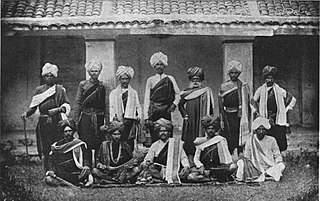
Vokkaliga is a community of closely related castes, from the Indian states of Karnataka and Tamil Nadu.
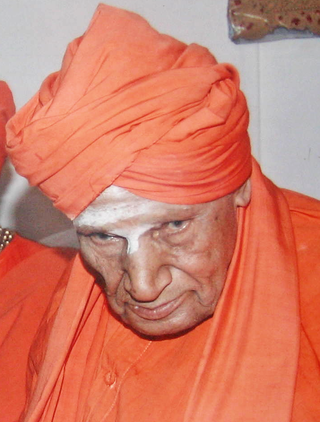
Shivakumara Swami was an Indian humanitarian, spiritual leader, educator and supercentenarian. He was a Lingayatism religious figure. Swami joined the Siddaganga Matha in 1930 Karnataka and became head seer in 1941. He also founded the Sri Siddaganga Education Society. Described as the most esteemed adherent of Lingayatism (Veerashaivism), he was referred to as Nadedaaduva Devaru in the state. In 2015, Swami was awarded by the Government of India the Padma Bhushan, India's third highest civilian award.
Sangli-Miraj & Kupwad is urban agglomeration and a municipal corporation in Sangli district in the Indian state of Maharashtra.

Kudalasangama in India is an important centre of pilgrimage for Lingayats. It is located about 15 kilometres (9.3 mi) from the Almatti Dam in Bagalkote district of Karnataka state. The Krishna and Malaprabha River rivers merge here and flow east towards Srisailam Andhra Pradesh. The Aikya Mantapa or the holy Samādhi of Basavanna, the founder of the Lingayatism along with Linga, which is believed to be self-born (Swayambhu), is here. The Kudala Sangama Development Board takes care of the maintenance and development.
Ulavi is a village in the Uttara Kannada district in the Indian state of Karnataka. Ulavi is a village about 75 kilometres (47 mi) from Karwar in Karnataka state, India.
Lingadahalli is a village and a hobli in Tarikere Taluk, Chikmagalur district, Karnataka, India. Lingadahalli is one of the prominent pre-historic sites in Karnataka state. The location code number of Lingadahalli as per census of India 2011 are, 609336 and 609334 (kaval).

In India, a caste, although a western stratification arrived from Portuguese word Casta and Latin word castus, is a social group where membership is decided by birth. Broadly, Indian castes are legally divided into Forward Castes, Other Backward Classes, Scheduled Castes, and Scheduled Tribes. Indian Christians and Indian Muslims are also function as castes. With castes separating individuals into different social groups, it follows that each group will have conflicting interests; oftentimes putting those with lower social standing in less favorable positions. The Constitutuent Assembly which was head by B.R. Ambedkar, the founder of the Depressed Classes Association which had originally put forward these demands, created the reservation system, which essentially acts as affirmative action to provide representation to caste groups that have been systematically disadvantaged. However other castes which have not been provided reservations, have called this system unfair and politically motivated. There have also been other cases where political parties, like the Bahujan Samaj Party (BSP), was formed to represent the minority or lower communities.
Caste-related violence in India has occurred and continues to occur in various forms.

Siddhagiri Gramjivan Museum (Kaneri Math) at Kaneri, Kolhapur district, Maharashtra, is a sculpture museum. The full name is Siddhagiri Gramjivan (Village life) Museum. It is situated at Shri Kshetra Siddhagiri Math, a campus built around the Moola-Kaadsiddheswar Shiva temple.
Paul Chirakkarode was a noted Malayalam- and English-language author, social critic, orator, and human rights activist. The author has been considered one of the pioneers of Dalit Literary Movement in India.
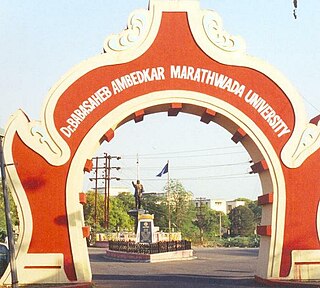
Namantar Andolan was a Dalit and Navayana Buddhist movement to change the name of Marathwada University, in Aurangabad, Maharashtra, India, to Dr. Babasaheb Ambedkar University. It achieved a measure of success in 1994, when the compromise name of Dr. Babasaheb Ambedkar Marathwada University was accepted. The movement was notable for the violence against Dalits and Navayana Buddhists.

Dr Ratnappa Bharamappa Kumbhar, also called Deshbhakt Ratnappa Kumbhar, was an Indian independence activist from Ichalkaranji, who actively participated in the Indian independence movement. He was one of the persons to sign the Final Draft of the Constitution of India along with B. R. Ambedkar. He received Padma Shri award in 1985. He was Member of the Parliament, Member of Legislative Council and also worked as a Minister of Food and Civil Supplies in Maharashtra Government.
Junjarwad also written as Zunjarwad is a village in Belgaum district in the southern state of Karnataka, India. This is located at a distance of 33km from taluk headquarter Athani. Major occupation of the habitats is agriculture and village has around 3000 acres of agriculture land. Sugar cane is the primary crop. Majority of the villagers belongs to digambarJain religion .Other religions like lingayat, Islam and others are also practiced by villagers
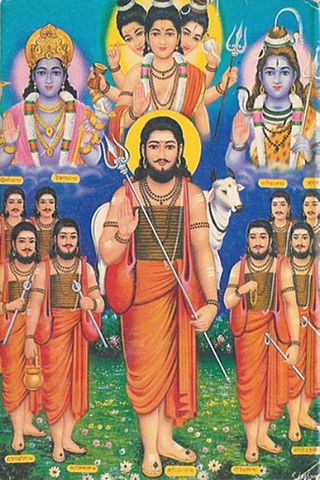
The Inchagiri Sampradaya, also known as Nimbargi Sampradaya, is a lineage of Hindu Navnath and Lingayat teachers from Maharashtra and Karnataka, which was started by Bhausaheb Maharaj. It is inspired by Sant Mat teachers as Namdev, Raidas and Kabir. The Inchagiri Sampradaya has become well known throughout the western world due to the popularity of Nisargadatta Maharaj.

The Vanchit Bahujan Aaghadi is an Indian political party founded by Prakash Ambedkar on 20 March 2018. The party is primarily based in Maharashtra in India. Vanchit Bahujan Aaghadi follows Phule-Ambedkarite ideology.
Chambhar is caste from Indian state of Maharashtra, and Northern Karnataka. Their traditional occupation was leather work. Historically subject to untouchability, they were traditionally outside the Hindu ritual ranking system of castes known as varna. Castes with similar traditional occupation are found throughout the Indian subcontinent such as Chamar in Northern india, and Mochi in Gujarat.
Haralayya was a 12th-century Dalit saint and poet of Vachana sahitya in India. He joined Anubhava Mantapa, the hall created by Basava, where every caste was welcome.
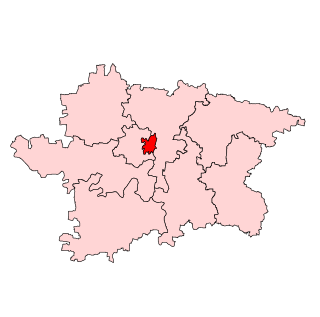
Gulbarga Uttar Assembly seat is one of 224 assembly constituencies in Karnataka State, in India. It is part of Gulbarga. The major communities residing in this constituency are Lingayats, Muslims, and Dalits. The constituency is known for its historical and cultural significance, with several ancient temples and monuments located in the area.













